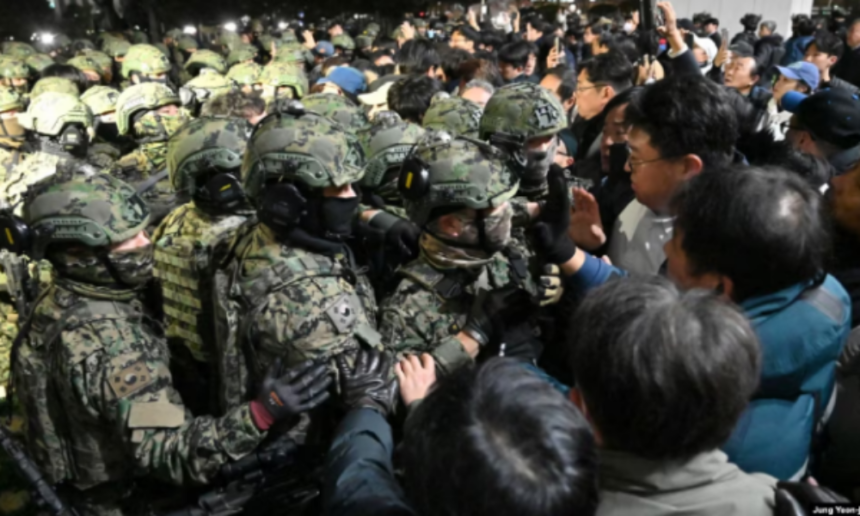Prosecutors in South Korea have arrested former Defense Minister Kim Yong Hyun in connection with his alleged recommendation to declare a state of war, a decision that was made earlier this week by President Yoon Suk Yeol. However, the declaration was later rescinded by the president. Kim is the first high-ranking official to be arrested in connection with the incident.
This development comes a day after President Yoon narrowly avoided a motion for his impeachment initiated by opposition parties in Parliament. Lawmakers from the ruling party boycotted the vote, and the motion to suspend the president’s duties requires a two-thirds majority in Parliament. The main opposition party, the Democratic Party, announced plans to prepare a new motion for the president’s impeachment.
On December 8, Kim was sent to a detention center in Seoul after being investigated by prosecutors, according to a law enforcement official who spoke on condition of anonymity. The official did not provide further details, but South Korean media reported that Kim voluntarily appeared before the prosecutor’s office in Seoul, where his mobile phone was confiscated and he was arrested. Police also searched Kim’s home and former office on Sunday.
During a televised statement on December 8, Senior Prosecutor Park Se-hyun confirmed that an investigation had been launched through a special 62-member team to probe the war state declaration. Park, who is leading the team, stated that the investigation “will leave no stone unturned” in pursuit of any suspects.
President Yoon accepted Kim’s resignation on December 5, following the submission of a separate impeachment motion by opposition parties. Kim played a central role in implementing the state of war declared by Yoon. He led special forces to surround the National Assembly building while military helicopters patrolled above. The military withdrew after Parliament unanimously voted to overturn President Yoon’s decree, forcing him to retract the decision on Wednesday.
In the motion for Kim’s impeachment, which was initiated by the Democratic Party and other opposition parties, he was accused of recommending that the president declare a state of war. Deputy Defense Minister Kim Seon Ho informed Parliament that Kim Yong Hyun had ordered the deployment of troops around the National Assembly.
In a statement earlier this week, Kim acknowledged that “all troops performed their duties based on the decision to declare a state of war and acted according to my instructions, and I bear full responsibility.”
On Thursday, the Attorney General, Shim Woo, told reporters that prosecutors plan to investigate charges of rebellion against President Yoon. While the president enjoys some immunity from criminal prosecution while in office, this immunity does not extend to charges of rebellion or treason.
The Ministry of Defense has suspended three senior military commanders amid suspicions of their involvement in implementing the state of war. They are named in a complaint filed by opposition parties accusing them of rebellion.
A day earlier, President Yoon apologized for declaring the state of war, as protesters gathered outside the Parliament building where the impeachment motion was being debated, which ultimately failed.
“The declaration of the state of war came from my desperation as president,” he said in a televised address.
When he declared the state of war, Yoon claimed that the decision “would eliminate anti-state elements obstructing the freedoms and happiness of the people.” Security forces surrounded the National Assembly, and helicopters landed on the building’s roof. Nearly 300 soldiers attempted to block the building, but Parliament staff managed to prevent their entry. Inside Parliament, enough lawmakers voted against Yoon’s decision.
Lawmakers from both the ruling and opposition parties said the soldiers had been ordered to arrest senior politicians, and special police units were reportedly instructed to remove lawmakers from the Parliament building.







